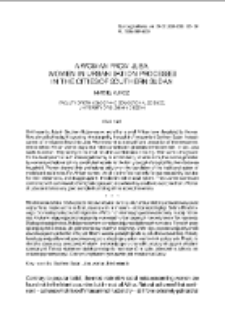- Search in all Repository
- Literature and maps
- Archeology
- Mills database
- Natural sciences
Advanced search
Advanced search
Advanced search
Advanced search
Advanced search

Object
Title: A Woman of Juba. Women in Urbanisation Processes in the Cities of Southern Sudan
Subtitle:
Ethnologia Polona 29-30 (2008-2009)
Publisher:
Institute of Archaeology and Ethnology Polish Academy of Sciences
Place of publishing:
Description:
Type of object:
Abstract:
Until recently, Juba in Southern Sudan was no more than a small African town devastated by the war. Now, almost by the day, it is growing into a large city, the capital of independent Southern Sudan. A steady current of immigrants flows into Juba. Women constitute a significant proportion of the newcomers. Unlike before, African women play a vital role in urbanisation processes on the continent. In fact, Juba needs its women. They belong to the most industrious individuals in the city. Their work is the ground for the development in such areas as gastronomy or food industry. What is more, the income generated by women’s professional activity constitutes the basis for the family budget of a typical Southern Sudanese household. Women channel their professional activity on the foundation of the traditional system of models and social roles. For African women, the city is the field not only for business activity, but also for their resistance to, and struggle against, the discriminative social system. This is where women are confronted with such views to the highest degree, and also where they are able to overcome them. Women of Juba constitute a very good example illustrating all the above phenomena
References:
Arnfred S., Utas M., 2007, Re-thinking Africa. A Contribution to Swedish Government White Paper on Africa, Nordic African Institute, Uppsala
Curtin P., Feierman S., Thompson L., Vansina J., 2003, Historia Afryki, Marabut, Gdańsk
Donnan H., Wilson T. M., 2007, Granice tożsamości, narodu, państwa, Wydawnictwo Uniwersytetu Jagiellońskiego, Cracow (1st edition 1999)
Kenyon S. M., 1991, Five Women of Sennar. Culture and Change in Central Sudan, Clarendon Press, Oxford
Little K., 1973, African Women in Towns. An Aspect of Africa’s Social Revolution, Cambridge University Press, London
Falade S., 1963, Women of Dakar and the Surrounding Urban Area, [in:] Women of Tropical Africa, ed. Paulme D., University of California Press, Berkley and Los Angeles, pp. 217–231
Flynn K. C., 2005, Food, Culture, and Survival in African City, Palgrave Macmillan, New York
Hjort A., 1979, Savanna Town. Rural Ties and Urban Opportunities in Northern Kenya, Stockholm Studies in Social Anthropology
Iliffe J., 2005, Africa. A History of the Continent, Cambridge University Press
Shorter A., 2001, African Culture. An Overview, Paulines Publications Africa, Nairobi
Relation:
Volume:
Start page:
End page:
Detailed Resource Type:
Format:
Resource Identifier:
oai:rcin.org.pl:61478 ; 0137-4079
Source:
IAiE PAN, call no. P 366 ; IAiE PAN, call no. P 367 ; IAiE PAN, call no. P 368 ; click here to follow the link
Language:
Digitizing institution:
Institute of Archaeology and Ethnology of the Polish Academy of Sciences
Original in:
Library of the Institute of Archaeology and Ethnology of the Polish Academy of Sciences
Access:
Object collections:
- Digital Repository of Scientific Institutes > Partners' collections > Institute of Archeology and Ethnology PAS > Institute Publications
- Digital Repository of Scientific Institutes > Partners' collections > Institute of Archeology and Ethnology PAS > Institute Publications > Current Journals
- Digital Repository of Scientific Institutes > Literature > Journals/Articles
- Digital Repository of Scientific Institutes > Partners' collections > Institute of Archeology and Ethnology PAS > Institute Publications > Current Journals > Ethnologia Polona
Last modified:
Feb 2, 2022
In our library since:
Jan 10, 2017
Number of object content downloads / hits:
21
All available object's versions:
https://rcin.org.pl./publication/76190
Show description in RDF format:
Show description in RDFa format:
Show description in OAI-PMH format:
| Edition name | Date |
|---|---|
| Kurcz, Maciej, 2008-2009, A Woman of Juba. Women in Urbanisation Processes in the Cities of Southern Sudan | Feb 2, 2022 |
Objects Similar
Bąbel, Agnieszka
Kurcz, Maciej
Wiślicz, Tomasz (1969– )

 INSTYTUT ARCHEOLOGII I ETNOLOGII POLSKIEJ AKADEMII NAUK
INSTYTUT ARCHEOLOGII I ETNOLOGII POLSKIEJ AKADEMII NAUK
 INSTYTUT BADAŃ LITERACKICH POLSKIEJ AKADEMII NAUK
INSTYTUT BADAŃ LITERACKICH POLSKIEJ AKADEMII NAUK
 INSTYTUT BADAWCZY LEŚNICTWA
INSTYTUT BADAWCZY LEŚNICTWA
 INSTYTUT BIOLOGII DOŚWIADCZALNEJ IM. MARCELEGO NENCKIEGO POLSKIEJ AKADEMII NAUK
INSTYTUT BIOLOGII DOŚWIADCZALNEJ IM. MARCELEGO NENCKIEGO POLSKIEJ AKADEMII NAUK
 INSTYTUT BIOLOGII SSAKÓW POLSKIEJ AKADEMII NAUK
INSTYTUT BIOLOGII SSAKÓW POLSKIEJ AKADEMII NAUK
 INSTYTUT CHEMII FIZYCZNEJ PAN
INSTYTUT CHEMII FIZYCZNEJ PAN
 INSTYTUT CHEMII ORGANICZNEJ PAN
INSTYTUT CHEMII ORGANICZNEJ PAN
 INSTYTUT FILOZOFII I SOCJOLOGII PAN
INSTYTUT FILOZOFII I SOCJOLOGII PAN
 INSTYTUT GEOGRAFII I PRZESTRZENNEGO ZAGOSPODAROWANIA PAN
INSTYTUT GEOGRAFII I PRZESTRZENNEGO ZAGOSPODAROWANIA PAN
 INSTYTUT HISTORII im. TADEUSZA MANTEUFFLA POLSKIEJ AKADEMII NAUK
INSTYTUT HISTORII im. TADEUSZA MANTEUFFLA POLSKIEJ AKADEMII NAUK
 INSTYTUT JĘZYKA POLSKIEGO POLSKIEJ AKADEMII NAUK
INSTYTUT JĘZYKA POLSKIEGO POLSKIEJ AKADEMII NAUK
 INSTYTUT MATEMATYCZNY PAN
INSTYTUT MATEMATYCZNY PAN
 INSTYTUT MEDYCYNY DOŚWIADCZALNEJ I KLINICZNEJ IM.MIROSŁAWA MOSSAKOWSKIEGO POLSKIEJ AKADEMII NAUK
INSTYTUT MEDYCYNY DOŚWIADCZALNEJ I KLINICZNEJ IM.MIROSŁAWA MOSSAKOWSKIEGO POLSKIEJ AKADEMII NAUK
 INSTYTUT PODSTAWOWYCH PROBLEMÓW TECHNIKI PAN
INSTYTUT PODSTAWOWYCH PROBLEMÓW TECHNIKI PAN
 INSTYTUT SLAWISTYKI PAN
INSTYTUT SLAWISTYKI PAN
 SIEĆ BADAWCZA ŁUKASIEWICZ - INSTYTUT TECHNOLOGII MATERIAŁÓW ELEKTRONICZNYCH
SIEĆ BADAWCZA ŁUKASIEWICZ - INSTYTUT TECHNOLOGII MATERIAŁÓW ELEKTRONICZNYCH
 MUZEUM I INSTYTUT ZOOLOGII POLSKIEJ AKADEMII NAUK
MUZEUM I INSTYTUT ZOOLOGII POLSKIEJ AKADEMII NAUK
 INSTYTUT BADAŃ SYSTEMOWYCH PAN
INSTYTUT BADAŃ SYSTEMOWYCH PAN
 INSTYTUT BOTANIKI IM. WŁADYSŁAWA SZAFERA POLSKIEJ AKADEMII NAUK
INSTYTUT BOTANIKI IM. WŁADYSŁAWA SZAFERA POLSKIEJ AKADEMII NAUK


































